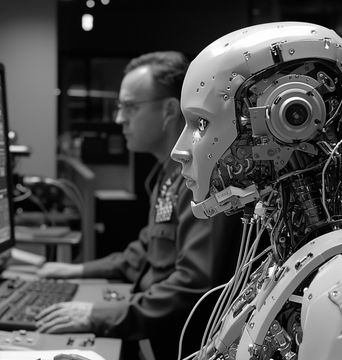AI TITANS WALK TIGHTROPE: AIDING PENTAGON WITHOUT AI WEAPONIZATION

In an ever-evolving technological landscape, top artificial intelligence (AI) developers such as OpenAI, Anthropic, and Meta are partnering with the U.S. military to make their defense systems more efficient, while also striving to ensure that this advanced tech doesn't cause harm to humans.
The AI technology, which is now being employed to identify, track, and assess threats, furnishes the U.S. Department of Defense with a significant advantage. Crucially, it has proved especially useful during the intricate planning and strategizing phases of the military's kill chain process, which embodies the steps of identifying, tracking, targeting, engaging, and assessing an adversary or potential threat.
In a pivotal move in 2024, distinguished AI companies including OpenAI, Anthropic, and Meta revised their usage policies to permit U.S. defense agencies to utilize their AI models. By partnering with various defense contractors, these AI developers have brought a new dimension of warfare to defense agencies.
However, such advances do not come without controversy. The question of whether AI should be permitted to make life-or-death decisions in a military context is a contentious topic, one that has stirred considerable debate. Dr. Radha Plumb, the Pentagon's chief digital and AI officer, has waded into this discussion, assuring that human involvement will always be integral in the decision-making process to employ force, emphasizing the complementarity of AI technology with human judgment rather than its replacement.
Despite the military collaborations being viewed as progressive by some, they have also elicited pushback from Silicon Valley employees, though the outcry within the AI community has been comparably muted. Some researchers argue that the use of AI in the military context is an unavoidable future, therefore making it critical to maintain a proactive engagement with the military to ensure the correct and ethically sound use of their AI models.
As we peer into the future of military operations, it's evident that AI technology will play an integral role. Its implementation is not intended to eclipse human judgment and decision-making, but rather to augment, enhance, and refine those processes. The onus now lies on AI researchers and developers to navigate this complex landscape, balancing the potent benefits of AI with the ethical imperative to use such technology responsibly.
The incorporation of AI in the U.S. military landscape inevitably opens a Pandora's box of ethical questions and implications. How the AI community, military, and society at large answer these questions will have a profound impact on the course of our future. As we progress further into this new era of AI-infused defense systems, it is without a doubt that the decisions made now will significantly shape the battlefield of tomorrow.